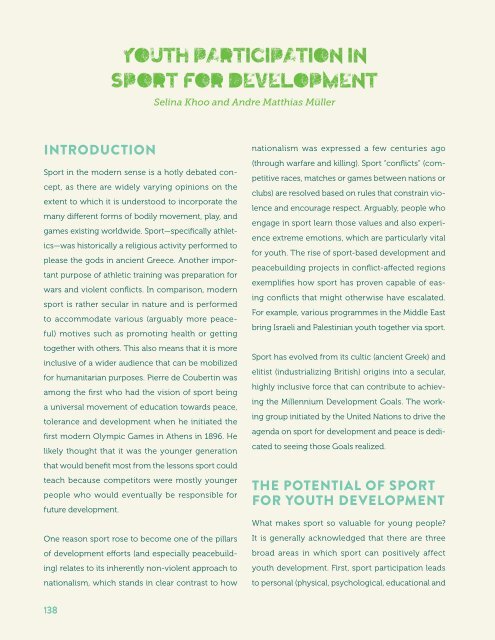YOUTH CIVIC
JieguI2U
JieguI2U
You also want an ePaper? Increase the reach of your titles
YUMPU automatically turns print PDFs into web optimized ePapers that Google loves.
<strong>YOUTH</strong> PARTICIPATION IN<br />
SPORT FOR DEVELOPMENT<br />
Selina Khoo and Andre Matthias Müller<br />
INTRODUCTION<br />
Sport in the modern sense is a hotly debated concept,<br />
as there are widely varying opinions on the<br />
extent to which it is understood to incorporate the<br />
many different forms of bodily movement, play, and<br />
games existing worldwide. Sport—specifically athletics—was<br />
historically a religious activity performed to<br />
please the gods in ancient Greece. Another important<br />
purpose of athletic training was preparation for<br />
wars and violent conflicts. In comparison, modern<br />
sport is rather secular in nature and is performed<br />
to accommodate various (arguably more peaceful)<br />
motives such as promoting health or getting<br />
together with others. This also means that it is more<br />
inclusive of a wider audience that can be mobilized<br />
for humanitarian purposes. Pierre de Coubertin was<br />
among the first who had the vision of sport being<br />
a universal movement of education towards peace,<br />
tolerance and development when he initiated the<br />
first modern Olympic Games in Athens in 1896. He<br />
likely thought that it was the younger generation<br />
that would benefit most from the lessons sport could<br />
teach because competitors were mostly younger<br />
people who would eventually be responsible for<br />
future development.<br />
One reason sport rose to become one of the pillars<br />
of development efforts (and especially peacebuilding)<br />
relates to its inherently non-violent approach to<br />
nationalism, which stands in clear contrast to how<br />
nationalism was expressed a few centuries ago<br />
(through warfare and killing). Sport “conflicts” (competitive<br />
races, matches or games between nations or<br />
clubs) are resolved based on rules that constrain violence<br />
and encourage respect. Arguably, people who<br />
engage in sport learn those values and also experience<br />
extreme emotions, which are particularly vital<br />
for youth. The rise of sport-based development and<br />
peacebuilding projects in conflict-affected regions<br />
exemplifies how sport has proven capable of easing<br />
conflicts that might otherwise have escalated.<br />
For example, various programmes in the Middle East<br />
bring Israeli and Palestinian youth together via sport.<br />
Sport has evolved from its cultic (ancient Greek) and<br />
elitist (industrializing British) origins into a secular,<br />
highly inclusive force that can contribute to achieving<br />
the Millennium Development Goals. The working<br />
group initiated by the United Nations to drive the<br />
agenda on sport for development and peace is dedicated<br />
to seeing those Goals realized.<br />
THE POTENTIAL OF SPORT<br />
FOR <strong>YOUTH</strong> DEVELOPMENT<br />
What makes sport so valuable for young people?<br />
It is generally acknowledged that there are three<br />
broad areas in which sport can positively affect<br />
youth development. First, sport participation leads<br />
to personal (physical, psychological, educational and<br />
138


